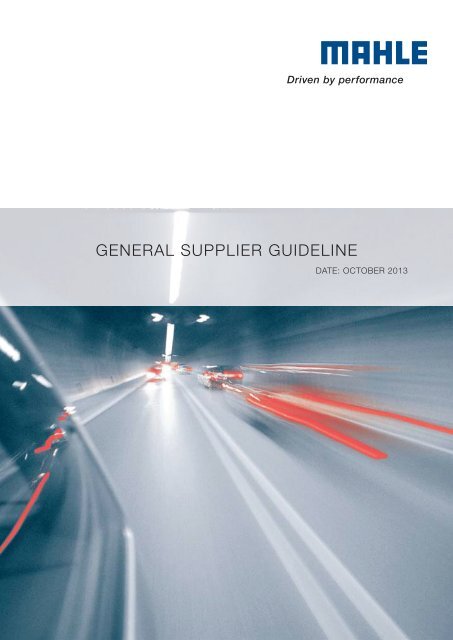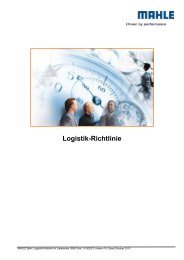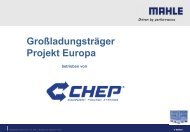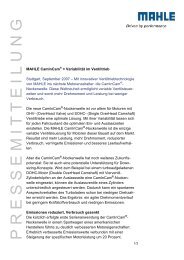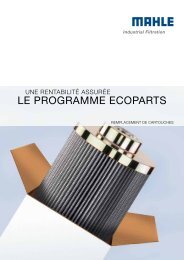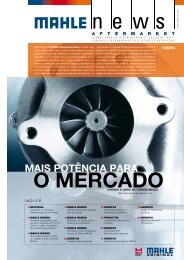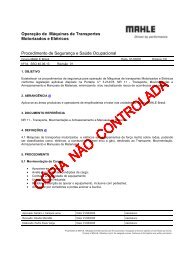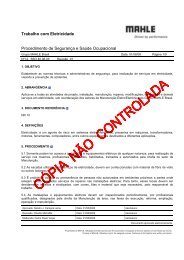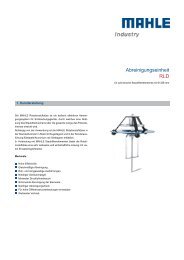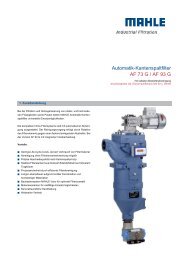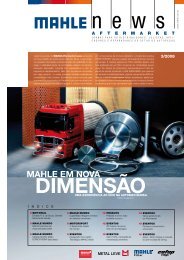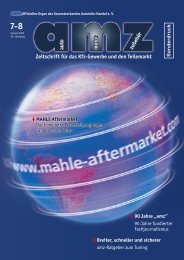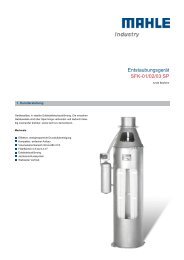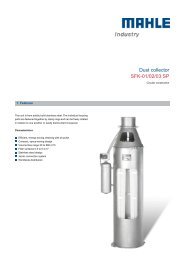130925_mahle_General Supplier Guideline_02.indd - Mahle-industry
130925_mahle_General Supplier Guideline_02.indd - Mahle-industry
130925_mahle_General Supplier Guideline_02.indd - Mahle-industry
You also want an ePaper? Increase the reach of your titles
YUMPU automatically turns print PDFs into web optimized ePapers that Google loves.
GENERAL SUPPLIER GUIDELINE<br />
DATE: OCTOBER 2013
Introduction<br />
With its two business units Engine Systems and Components as well as Filtration and Engine Peripherals, MAHLE<br />
ranks among the top three systems suppliers worldwide. In 2014, the Behr Group—which ranks among the leading<br />
OEMs worldwide in vehicle air conditioning and engine cooling—will be integrated into the MAHLE Group as the<br />
Thermal Management business unit. All of the Group’s nonautomotive activities are combined in the Industry business<br />
unit with products from the application areas of filtration, thermal management, and large engines for industrial<br />
purposes. The Aftermarket business unit serves the independent spare parts market with MAHLE products in OE<br />
quality. MAHLE has a local presence in all major world markets. In 2014, some 65,000 employees at 140 production<br />
locations and ten major research and development centers are expected to generate sales of around ten billion euros.<br />
Worldwide competition, changing customer expectations and product requirements necessitate the continuous<br />
improvement of all products, processes and corporate procedures. The quality and position of our products in the<br />
world market are also directly affected by the quality of our suppliers’ products. Increasing customer requirements<br />
and highly dynamic global markets require a high degree of responsiveness, flexibility and global orientation from<br />
us and our suppliers. The continuous improvement of products and processes as well as the sustained preservation<br />
of quality and costs affect the entire procurement network, in which you as a supplier play an important role. These<br />
guidelines are intended to outline the expectations, requirements, prerequisites, methods as well as implementation<br />
examples necessary to achieve our common objectives. These guidelines are binding for all products and services<br />
provided by a supplier to MAHLE. Continuing guidelines may exists on regional / plant level.<br />
Dr. Christian Binkert<br />
Johann Meier<br />
Stefan Maier<br />
Vice President<br />
Controlling & Purchasing<br />
Engine Systems and Components<br />
Director<br />
Purchasing<br />
Filtration and Engine Peripherals<br />
Vice President<br />
Purchasing & Logistics<br />
Thermal Management<br />
MAHLE: <strong>General</strong> <strong>Supplier</strong> <strong>Guideline</strong>s, Date: October 2013, © MAHLE 2013<br />
2
Requirements and Benefi ts<br />
Our requirements placed on you as a MAHLE supplier or a provider interested in future collaboration, as outlined<br />
below, are an important pillar for an efficient and successful business relationship. Your fundamental willingness to<br />
accept the obligations is a prerequisite for our mutual business relations.<br />
From you, as a supplier, we expect a high commitment to performance and the dedication to accept these requirements<br />
and implement them:<br />
■<br />
■<br />
■<br />
■<br />
■<br />
■<br />
■<br />
■<br />
Assuring consistent, high product and process quality<br />
100% fulfillment of MAHLE’s expectations and those of our customers<br />
100% delivery performance<br />
Competitive quotations on a global market level (total cost of ownership)<br />
Continuous productivity improvement and annual cost reductions<br />
Effective and prompt communication<br />
Products based on state-of-the-art technology<br />
Acceptance of systems development responsibility<br />
We look to you as creative and innovative partners on the procurement market, who support us with your experience<br />
in the expansion of our technological leadership position. The benefits are as follows:<br />
■<br />
■<br />
■<br />
■<br />
■<br />
Easier access as a qualified MAHLE supplier to additional business segments<br />
Participation in the innovation and creativity potential of the MAHLE Group<br />
Potential sales growth and market share growth<br />
Integration in international development projects and access to new markets<br />
MAHLE as a reference in your customer list<br />
The materials and products we procure from our suppliers have a crucial influence on the quality of our products.<br />
The extremely high requirements in the automotive <strong>industry</strong> challenge us and our suppliers to excellence every day.<br />
We accept this challenge.<br />
MAHLE: <strong>General</strong> <strong>Supplier</strong> <strong>Guideline</strong>s, Date: October 2013, © MAHLE 2013<br />
3
Overview of the Main Steps of the MAHLE <strong>Supplier</strong> Management System<br />
<strong>Supplier</strong><br />
Selection<br />
Quality and logistics<br />
planning supplier<br />
Series Production<br />
■ RFQ<br />
■ project planning and<br />
■ nomination ■ process development<br />
■ evaluation<br />
definition<br />
■ selection<br />
■ product development<br />
■ product/process approval<br />
■ series production<br />
approval<br />
■ supplier monitoring<br />
■ continuous supplier<br />
evaluation<br />
■ suppler development<br />
■ complaint management<br />
■ change management<br />
■ supplier history<br />
Project confirmation Product/process development Series production ramp-up Project completion<br />
During the supplier selection process, potential suppliers stand out by meeting our requirements for specifications,<br />
innovation, quality and cost. Partnership and trust form the basis of our collaboration with suppliers. After being nominated,<br />
our suppliers assume responsibility to achieve the challenging objectives. Crucial requirements include the<br />
production and delivery capability as well as the fulfillment of our quality expectations, starting on the first day of<br />
production all the way to the end of the product life cycle. A large portion of the purchased parts and the corresponding<br />
production processes are developed by our suppliers. This underlines the importance and our high demands<br />
on the development and procurement partners worldwide when it comes to the design of MAHLE products.<br />
Throughout the product and process development and series production stages, all conceivable risks must be identified<br />
and minimized as early as possible. During this risk assessment process, our direct suppliers must assume<br />
responsibility for the entire supply chain of the ordered parts, starting at the interface with the MAHLE Group to your<br />
own suppliers and beyond.<br />
Within the scope of the approval process and prior to the commencement of series production, our suppliers must<br />
demonstrate their ability to manufacture and supply production parts that meet all relevant requirements, using stable<br />
production and delivery processes and production tools and processes, at the agreed cost. The responsibility<br />
for performing all necessary steps lies with the supplier.<br />
In the event that problems occur during the product, and process development or series delivery, they must be<br />
clearly identified and resolved as effectively as possible. A defined escalation process serves the efficient use of resources<br />
in the problem-solving process. The problem shall be addressed based on open communication, trust and<br />
a functioning partnership. The problem-solving process shall be the responsibility of the supplier, while integrating<br />
the involved areas of the MAHLE Group.<br />
MAHLE: <strong>General</strong> <strong>Supplier</strong> <strong>Guideline</strong>s, Date: October 2013, © MAHLE 2013<br />
4
<strong>General</strong> MAHLE <strong>Supplier</strong> Requirements<br />
Criterion<br />
Requirements placed on the supplier<br />
by MAHLE<br />
Implementation and verification<br />
Experience in the automotive<br />
/ automotive<br />
supply <strong>industry</strong><br />
Existing collaboration with automobile<br />
manufacturers / automotive suppliers.<br />
Familiarity with and use of distinct<br />
specifications and methods relating to<br />
the automotive <strong>industry</strong>.<br />
■<br />
List of references<br />
Global presence<br />
Quality and environmental<br />
management system<br />
Global orientation to support MAHLE<br />
as a worldwide manufacturer, world<br />
market orientation and the ability to<br />
supply all international MAHLE locations.<br />
Effective implementation of a quality<br />
and environmental management system.<br />
Minimum requirement is a valid<br />
certification according to DIN ISO<br />
9001:2008. Compliance with automotive<br />
standards on the basis of ISO TS<br />
16949:2009. Certification according to<br />
ISO/TS 16949:2009 must be planned<br />
and implemented. Compliance with<br />
DIN EN ISO 14001.<br />
■ International support as key<br />
account<br />
■ Production plants on all continents/<br />
in all countries,<br />
■ including Leading Competition<br />
Countries<br />
■ Valid certificate based on<br />
DIN ISO 9001:2008 (minimum) or<br />
ISO TS 16949: 2009<br />
■ Implementation of DIN EN ISO<br />
14001<br />
Preventive methods<br />
for failure detection<br />
and prevention<br />
Failure prevention before failure detection.<br />
Obligation to follow the “zero<br />
error principle”. Product and performance<br />
responsibility throughout the<br />
entire process chain, from the development<br />
to the end customer.<br />
■<br />
■<br />
■<br />
■<br />
■<br />
Quality control systems<br />
Continuous improvement projects<br />
Data analyses<br />
Early warning systems<br />
Poka Yoke<br />
Procurement and<br />
supplier management<br />
Systematic selection and evaluation of<br />
sub-contractors. Assignment of the<br />
MAHLE requirements to your subcontractors.<br />
Implementation of qualification<br />
activities at/with sub-contractors.<br />
Procurement only from certified<br />
sub-contractors. Minimum requirement<br />
placed on your sub-contractors<br />
is a valid certificate according to DIN<br />
ISO 9001:2008.<br />
■ Sub-contractor selection, development,<br />
optimization and evaluation<br />
system<br />
■ Scheduling and procurement from<br />
released and certified sub-contractors<br />
■ Valid certificates<br />
■ Advance product quality planning at<br />
sub-contractors (APQP according<br />
to QS9000)<br />
MAHLE: <strong>General</strong> <strong>Supplier</strong> <strong>Guideline</strong>s, Date: October 2013, © MAHLE 2013<br />
5
<strong>General</strong> MAHLE <strong>Supplier</strong> Requirements<br />
Criterion<br />
Requirements placed on the supplier<br />
by MAHLE<br />
Implementation and verification<br />
Contractual partnership<br />
Acceptance of the general supply<br />
contract, tooling supply contracts,<br />
confidentiality agreements, quality assurance<br />
agreements, special logistics<br />
agreements, consignment contracts,<br />
general conditions of purchase, willingness<br />
to reduce the incoming inspection<br />
at MAHLE.<br />
■<br />
Conclusion of the contract<br />
Cost structures<br />
Transparency and disclosure of the<br />
cost structures and pricing throughout<br />
the entire process chain. Determination<br />
of target prices and optimization<br />
of cost structures. Detailed breakdown<br />
of the prices of parts and tool<br />
cost.<br />
■<br />
■<br />
Transparent calculation<br />
Target costing<br />
Cost reduction potentials<br />
Implementation of cost reduction projects.<br />
Utilization of product potentials.<br />
<strong>Supplier</strong> cost reduction suggestion<br />
program.<br />
■ Value engineering projects together<br />
with MAHLE and with the sub-contractors.<br />
Continuous improvement<br />
Continuous improvement process for<br />
cost optimization and annual productivity<br />
increases. High competitiveness<br />
at a world market level with respect to<br />
price, quality, faithfulness to deadlines<br />
and flexibility.<br />
■<br />
■<br />
■<br />
KVP organization<br />
KVP projects<br />
<strong>Supplier</strong> suggestion program<br />
Communication and<br />
data exchange<br />
Close collaboration in the development<br />
phase. Compatibility with respect<br />
to data exchange. Processing of<br />
native data and EDI/web EDI. Willingness<br />
to actively collaborate in innovative<br />
development projects. Protection<br />
of the confidentiality of transmitted information.<br />
■ Resident Engineer for joint<br />
development projects<br />
■ IT-supported exchange of information<br />
(e.g. remote data transmission/<br />
EDI)<br />
■ Processing of native CAD data<br />
(among others, CATIA V4, CATIA<br />
V5, ProEngineer 2001 etc.)<br />
■ Processing of standard VDA<br />
formats (e.g. 4905, 4915 or EDI-<br />
FACT, ANSI)<br />
MAHLE: <strong>General</strong> <strong>Supplier</strong> <strong>Guideline</strong>s, Date: October 2013, © MAHLE 2013<br />
6
<strong>General</strong> MAHLE <strong>Supplier</strong> Requirements<br />
Criterion<br />
Requirements placed on the supplier<br />
by MAHLE<br />
Implementation and verification<br />
Project implementation<br />
Availability of appropriate resources/<br />
contact persons to meet MAHLE’s expectations.<br />
Set-up and implementation<br />
of a project management system.<br />
■<br />
■<br />
■<br />
Project organization<br />
Milestone planning<br />
Quality Gates<br />
Payment terms<br />
Handling of payments<br />
E-Business activities<br />
Provisions and insurance<br />
Change management<br />
Acceptance of standard MAHLE payment<br />
terms. Acceptance of MAHLE’s<br />
Conditions of Purchase.<br />
All customary payment methods. Willingness<br />
to settle deliveries/services<br />
through credit notes<br />
Participation in auctions and online<br />
bidding<br />
Insurance coverage for damages due<br />
to plant failures, property insurance<br />
for company capital goods, product liability<br />
and product recall insurance.<br />
Complete information about planned<br />
changes to products and processes<br />
(including by your sub-contractors).<br />
Compliance with the specifications for<br />
initial sampling and special identification.<br />
Documentation and traceability<br />
of all changes.<br />
■ Agreement on automotive-specific<br />
payment terms and conditions<br />
■ Credit note method according to<br />
VDA<br />
■ Business and product liability<br />
insurance<br />
■ Recall cost insurance<br />
■ Back-up plan for production<br />
disruptions<br />
■ Timely written notice of planned<br />
changes.<br />
■ Changes must be approved by<br />
MAHLE.<br />
■ Compliance with VDA Volume 2<br />
(PPF), QS9000 (PPAP)<br />
■ Product and process life cycle.<br />
Development planning<br />
Definition of the development objectives,<br />
development planning, development<br />
testing and evaluation, development<br />
release.<br />
■<br />
■<br />
■<br />
■<br />
■<br />
■<br />
Development objectives<br />
Development plan<br />
Specification<br />
Specificatin sheet<br />
Product data<br />
Testing and evaluations<br />
MAHLE: <strong>General</strong> <strong>Supplier</strong> <strong>Guideline</strong>s, Date: October 2013, © MAHLE 2013<br />
7
<strong>General</strong> MAHLE <strong>Supplier</strong> Requirements<br />
Criterion<br />
Requirements placed on the supplier<br />
by MAHLE<br />
Implementation and verification<br />
Feasibility studies<br />
Technical and scientific know-how.<br />
Definition of significant and critical<br />
characteristics. Creation of specifications<br />
and product data. Development<br />
testing. Ability to produce prototypes.<br />
Review of feasibility with respect to<br />
function and producibility.<br />
■<br />
■<br />
■<br />
■<br />
■<br />
■<br />
Product data<br />
Tests<br />
Simulations<br />
Lab tests<br />
Prototypes<br />
Development evaluations<br />
Advance quality planning<br />
Manufacturing concept<br />
Risk analyses<br />
Ability to implement automotive standards.<br />
Incorporation and application<br />
of failure-prevention methods and<br />
processes aimed at preventive quality<br />
assurance.<br />
The supplier must design a concept,<br />
which ensures that the supplier is able<br />
to meet MAHLE’s planned requirements<br />
during series production with<br />
respect to quantity and quality.<br />
Estimation of quality risks. Preventive<br />
use of systems FMEAs at product and<br />
process levels for the timely detection<br />
and prevention of defects. Definition<br />
and evaluation of significant and critical<br />
features.<br />
■ Quality planning based on QS9000<br />
(APQP) or VDA Volume 4.<br />
■ Process organization plan, including<br />
process steps and testing<br />
■ Process layout<br />
■ Capacity planning for pre-series<br />
and series production<br />
■ Emergency management<br />
■ Systems FMEA - product<br />
■ System-FMEA - process<br />
■ Systems FMEA - logistics<br />
■ Significant and critical<br />
characteristics<br />
Statistical processes<br />
Determination of required statistical<br />
processes for all stages of product<br />
implementation and within the scope<br />
of product and process development.<br />
Use of statistical processes and methods.<br />
■<br />
■<br />
■<br />
■<br />
■<br />
Test planning<br />
Simulations<br />
Capability analyses<br />
Statistical process control<br />
Quality control charts<br />
Test planning<br />
Ability to compile the test specifications<br />
based on automotive standards<br />
as well as to perform test method capability<br />
analyses.<br />
■ Control plans for prototypes,<br />
pre-series and series<br />
■ Inspection plans and instructions<br />
■ Capable inspection procedures<br />
MAHLE: <strong>General</strong> <strong>Supplier</strong> <strong>Guideline</strong>s, Date: October 2013, © MAHLE 2013<br />
8
<strong>General</strong> MAHLE <strong>Supplier</strong> Requirements<br />
Criterion<br />
Capability studies<br />
Product and process<br />
approval<br />
Requirements placed on the supplier<br />
by MAHLE<br />
Determination and evaluation of shortterm<br />
and machine capability process<br />
quality characteristics as well as longterm<br />
process capability characteristics<br />
of the manufacturing processes.<br />
Adherence to the required capabilities<br />
for production and testing equipment.<br />
Sampling management according to<br />
automotive standards. Data maintenance<br />
in the International Material<br />
Data System (IMDS). Production process<br />
approval. Internal process approval<br />
and approval of the series production<br />
/ testing equipment and tools.<br />
For the series production approval,<br />
the supplier must carry out manufacturing<br />
tests under production conditions.<br />
This is carried out within the<br />
scope of the pre-series, during which<br />
a defined quantity must be produced<br />
under production conditions.<br />
Implementation and verification<br />
■ Cm, Cmk >= 1.67<br />
■ n Pk, Ppk >= 1.67<br />
■ n Cg, Cgk >= 1.33<br />
■ Execution according to QS9000<br />
(PPAP) or VDA Volume 2 (PPF)<br />
■ Process series approval by MAHLE,<br />
including performance test<br />
(Run@Rate)<br />
■ Internal tool approval<br />
■ Results of the manufacturing tests<br />
■ Internal process approval<br />
■ Maintenance and repair instructions<br />
■ Production tools and equipment<br />
ready-for-production<br />
■ Staff qualification<br />
■ Introduction / training at the<br />
workplace<br />
■ Working / testing instructions<br />
■ Workplace / testing site layout<br />
MAHLE: <strong>General</strong> <strong>Supplier</strong> <strong>Guideline</strong>s, Date: October 2013, © MAHLE 2013<br />
9
<strong>General</strong> MAHLE <strong>Supplier</strong> Requirements<br />
Criterion<br />
Production planning<br />
and control<br />
Requirements placed on the supplier<br />
by MAHLE<br />
Translation of the MAHLE requirements<br />
into production orders, capacity<br />
planning, order control. Provision<br />
of suitable and capable production<br />
tools to safeguard controlled production.<br />
Provision of all necessary instructions.<br />
Unless individual arrangements apply,<br />
the minimum requirement of MAHLE<br />
is that the released quantities can be<br />
changed as follows:<br />
Up to four weeks prior to the delivery<br />
date, planned quantities can be modified<br />
by +/–30%.<br />
Up to three weeks prior to the delivery<br />
date, planned quantities can be modified<br />
by +/– 20%.<br />
Up to two weeks prior to the delivery<br />
date, planned quantities can be modified<br />
by +/–10%.<br />
Up to one week prior to the delivery<br />
date, planned quantities can be modified<br />
by +/–5%.<br />
The week before the delivery date, the<br />
planned quantities are fixed.<br />
Implementation and verification<br />
■ Capable manufacturing processes<br />
■ Further processing of the supply orders<br />
without systems breakdowns<br />
■ Application of PPS/ERP systems<br />
In-process quality<br />
assurance steps<br />
Planning and implementation of product<br />
and process testing.<br />
■<br />
■<br />
■<br />
■<br />
■<br />
In-process testing<br />
Statistical Process Control (SPC)<br />
Documentation of test results<br />
First-piece/last-piece testing<br />
Control of defective units<br />
Management of defects<br />
Assurance that no defective units are<br />
forwarded. Identification and control<br />
systems.<br />
■ Organizational regulations, provisions<br />
■ Accompanying documents for<br />
identification.<br />
■ Failure analyses<br />
MAHLE: <strong>General</strong> <strong>Supplier</strong> <strong>Guideline</strong>s, Date: October 2013, © MAHLE 2013<br />
10
<strong>General</strong> MAHLE <strong>Supplier</strong> Requirements<br />
Criterion<br />
Testing equipment<br />
management<br />
Requirements placed on the supplier<br />
by MAHLE<br />
Assuring capable inspection procedures.<br />
Periodic calibration of testing and<br />
measuring equipment used. Gauge<br />
monitoring.<br />
Implementation and verification<br />
■ Testing equipment monitoring<br />
system<br />
■ Calibration verification<br />
■ Accredited external service<br />
providers<br />
■ Measurement systems capability<br />
evaluations based on QS 9000<br />
(MSA) or VDA Volume 5<br />
■ Qualified testing staff<br />
Traceability<br />
Assurance of complete and comprehensive<br />
traceability of all products<br />
from the end user to your subcontractors.<br />
■<br />
■<br />
■<br />
■<br />
■<br />
Batch documentation<br />
Batch separation<br />
Product and container identification<br />
Compliance with FiFo principle<br />
Shipping documents<br />
Process capability<br />
Requalification<br />
Qualified employees<br />
Regular process capability analyses<br />
and evaluations. Observation of significant<br />
and critical characteristics. Adherence<br />
to the required capabilities.<br />
Response plans for out-of-spec processes.<br />
Planning and execution of periodic requalification<br />
inspections.<br />
Informed and qualified staff. Prompt<br />
implementation of qualification activities<br />
on the basis of a systematically<br />
determined qualification need. Training<br />
in the workplace. Promotion and<br />
determination of quality awareness.<br />
■ Cp, Cpk >= 1.33<br />
■ Periodic, comprehensive dimensional,<br />
functional and material crosschecks<br />
■ Qualification planning and<br />
verification<br />
■ Verification of introduction and<br />
training<br />
■ Workplace audits<br />
■ Stand-in provisions<br />
■ Qualification verification<br />
MAHLE: <strong>General</strong> <strong>Supplier</strong> <strong>Guideline</strong>s, Date: October 2013, © MAHLE 2013<br />
11
<strong>General</strong> MAHLE <strong>Supplier</strong> Requirements<br />
Criterion<br />
Logistic<br />
Test certificates<br />
Emergency management<br />
Documents and records<br />
Requirements placed on the supplier<br />
by MAHLE<br />
Acceptance and implementation of innovative<br />
delivery concepts Correct<br />
and conforming handling, storage and<br />
transport. Adherence to delivery date<br />
and quantity targets. On-going inspection<br />
and realignment of logistics<br />
processes and their continuous improvement<br />
with the participation of<br />
your sub-contractors. Compliance<br />
with MAHLE shipping and packaging<br />
instructions. Adherence to the identification<br />
instructions. Observation of the<br />
manufacturing dates and expiration<br />
dates. Qualified transport services<br />
providers.<br />
Guarantee of batch traceability. Assurance<br />
of compliance with required<br />
material specifications and required<br />
delivery quality.<br />
Protection processes or emergency<br />
concepts for installations, equipment,<br />
safety buffers and EDP. 100% guarantee<br />
of MAHLE supply.<br />
Regulating the control and archiving<br />
of specification and verification documents<br />
(record).<br />
Implementation and verification<br />
■ Consignment warehouse<br />
■ JIT<br />
■ Kanban<br />
■ Adherence to storage and transport<br />
instructions<br />
■ 100% compliance with delivery and<br />
quantity terms<br />
■ Application of FiFo principle<br />
■ Selection of packaging based on<br />
qualitative, economical and ecological<br />
aspects.<br />
■ Labeling according to VDA standard<br />
■ ASNs according to the MAHLE<br />
Standard<br />
■ Acceptance certificate according to<br />
DIN EN 10204 for commodities and<br />
materials<br />
■ Contingency plan<br />
■ Hotline<br />
■ Contact persons<br />
■ Service and maintenance agreements<br />
■ Flow charts listing responsible<br />
parties<br />
■ Control matrix for documents and<br />
records<br />
■ Retention: minimum of 15 years<br />
■ Observation of VDA Volume 1<br />
Complaint management<br />
Systematic implementation of corrective<br />
action and preventive measures in<br />
the team. Avoidance of repeat errors.<br />
Use of problem-solving methods.<br />
■<br />
■<br />
■<br />
■<br />
8D processes<br />
Pareto analyses<br />
Ask why<br />
Cause-and-effect diagram<br />
MAHLE: <strong>General</strong> <strong>Supplier</strong> <strong>Guideline</strong>s, Date: October 2013, © MAHLE 2013<br />
12
Problem Solving Path and Escalation Processes<br />
Escalation level Cause Action<br />
Level 1<br />
Product and service quality do comply<br />
with the agreements and requirements<br />
■<br />
None<br />
Level 2<br />
■ Problem-solving discussion with<br />
Product and service quality do not<br />
■ Insufficient reaction to complaints lysis, risk assessment, etc…)<br />
comply with the agreements and requirements<br />
supplier to clarify and define further<br />
action<br />
■ Product complaints<br />
■ Initiation and implementation of<br />
■ Faithfulness to quantities and deadlines<br />
unsatisfactory.<br />
measures on-site at supplier’s<br />
facility (audit, logistics process ana-<br />
Level 3<br />
Product and service quality do not<br />
comply with the agreements and requirements<br />
■ Severe deviations and complaints<br />
■ Repeat product complaints<br />
■ Line shut-down<br />
■ Insufficient ability and/or willingness<br />
to solve the problem<br />
■ Suspension of the supplier from requests<br />
for quotes and new orders.<br />
■ Decision regarding the execution of<br />
supplier development steps onsite<br />
at supplier’s facility<br />
■ Appointment of an alternative<br />
supplier, if necessary<br />
Course of the escalation process:<br />
MAHLE’s escalation process is broken down into three escalation levels, each of which basically follows the procedure<br />
outlined below:<br />
■<br />
■<br />
■<br />
■<br />
Analysis of escalation causes and problem<br />
Decision regarding measures to be implemented (e.g. 8D report, audit)<br />
Agreement on an action plan to eliminate the escalation causes<br />
Implementation of the action plan by the supplier<br />
■ Monitoring of the implementation process by MAHLE, followed by escalation to the next level or<br />
de-escalation, depending on outcome<br />
MAHLE: <strong>General</strong> <strong>Supplier</strong> <strong>Guideline</strong>s, Date: October 2013, © MAHLE 2013<br />
13
<strong>General</strong> supplier guidelines<br />
Contact:<br />
MAHLE GmbH<br />
Pragstraße 26-46<br />
D-70376 Stuttgart<br />
MAHLE Behr GmbH & Co. KG<br />
Mauserstraße 3<br />
D-70469 Stuttgart<br />
MAHLE Filtersysteme GmbH<br />
Pragstraße 26-47<br />
D-70376 Stuttgart<br />
Phone: +49 (0) 711/501-0<br />
E-Mail: purchasing@<strong>mahle</strong>.com<br />
Internet: www.einkauf.<strong>mahle</strong>.com<br />
MAHLE: <strong>General</strong> <strong>Supplier</strong> <strong>Guideline</strong>s, Date: October 2013, © MAHLE 2013<br />
14


